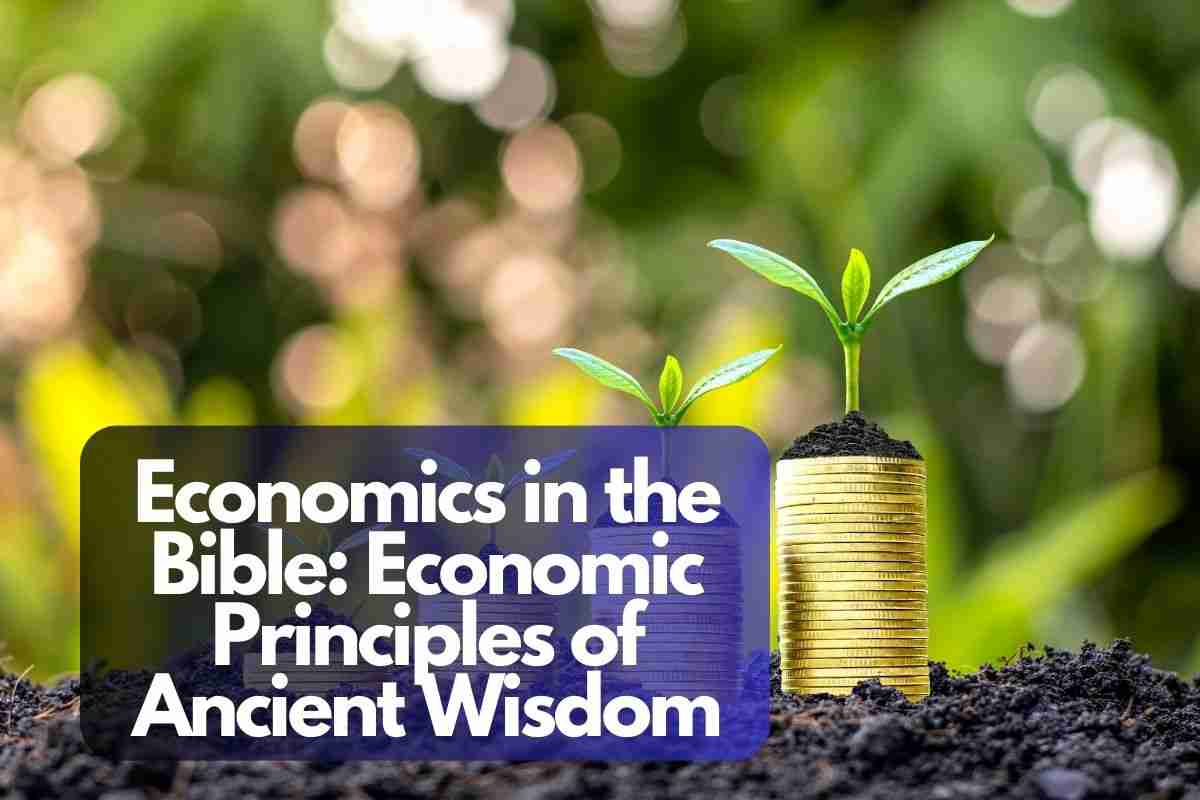In today’s world, economics is a complex field that analyzes the production, distribution, and consumption of goods and services. However, did you know that the Bible, a religious text with moral and spiritual teachings, also touches upon economic principles and concepts? While the Bible is not a comprehensive economic textbook, it contains valuable insights and lessons that can be applied to our understanding of economics and financial stewardship. In this article, we will explore the economics in the Bible and the wisdom it imparts.
Economic Principles in the Bible
The Bible emphasizes various economic principles that are relevant even in modern times. One of these principles is stewardship and responsibility. According to the Bible, humans are stewards of the resources provided by God, and they have a responsibility to use these resources wisely. This concept encourages individuals to be mindful of their economic choices and to act in ways that promote the common good.
Another key principle is the value of work and diligence. The Bible teaches that hard work leads to prosperity and blessings. It encourages individuals to be diligent in their endeavors, whether in business, agriculture, or any other field. This emphasis on work ethics and productivity can be seen as an endorsement of economic development and growth.
Furthermore, the Bible emphasizes justice and fairness in economic dealings. It condemns dishonest gain and encourages fair treatment of others in matters of trade, labor, and commerce. The concept of just weights and measures, for example, promotes honesty and integrity in business transactions.
Lastly, the Bible emphasizes the importance of generosity and charity. It encourages individuals to share their wealth with those in need and to practice acts of kindness and benevolence. This principle of generosity reminds us of the importance of considering the welfare of others and promotes a sense of community and solidarity.
Economic Systems in the Bible
When examining economics in the Bible, it is also important to consider the economic systems prevalent during biblical times. The Bible provides glimpses into various economic practices, such as barter and trade. In a barter system, goods and services are exchanged directly without the need for a common medium of exchange like money. This form of trade was common in ancient societies and played a vital role in their economic activities.
Moreover, the Bible portrays an agricultural economy, where farming and livestock rearing were central to the livelihood of many people. It emphasizes the importance of land, harvests, and wise agricultural practices for sustaining communities. These insights shed light on the economic realities of the time and provide lessons on resource management and sustainability.
Debt and slavery were also prevalent in biblical times. The Bible acknowledges the existence of debt and provides guidelines for its management. For example, the concept of the Jubilee Year, which occurred every fifty years, allowed for the cancellation of debts and the liberation of slaves. This practice aimed to prevent the accumulation of perpetual debt and to promote social justice.
Wealth and Prosperity in the Bible
The Bible acknowledges the pursuit of wealth and prosperity, but it also provides cautionary wisdom and principles to govern one’s approach to these goals. It recognizes that wealth can be a blessing from God, but it also warns against the dangers of greed and materialism.
Wisdom and financial planning are emphasized in the Bible as tools for managing wealth and avoiding financial pitfalls. The book of Proverbs, for instance, contains numerous practical teachings on money management, savings, and investment. It encourages individuals to seek wise counsel and to make informed decisions regarding their finances.
Contentment is another important principle taught in the Bible. It reminds individuals to be satisfied with what they have and to avoid the never-ending pursuit of wealth. This principle encourages a balanced perspective on material possessions and promotes gratitude for the blessings already received.
Lessons from Economic Parables
The Bible includes several parables that contain economic themes and lessons. One such parable is the Parable of the Talents, which teaches about stewardship, investment, and accountability. It emphasizes the importance of using one’s resources wisely and making them grow.
The Parable of the Rich Fool warns against the dangers of greed and hoarding wealth. It tells the story of a rich man who, consumed by his desire for material possessions, neglects to consider the eternal value of his life. This parable reminds individuals to prioritize spiritual and relational wealth over material possessions.
The Parable of the Prodigal Son also contains economic implications. It highlights the consequences of reckless spending and poor financial decisions, as seen through the experiences of a prodigal son who squanders his inheritance. This parable encourages prudence and responsible financial behavior.
Economic Ethics in the Bible
Ethics and integrity in economic dealings are important themes in the Bible. The concept of usury, for example, addresses the charging of excessive interest rates. The Bible discourages usury and promotes fair lending practices that do not exploit the vulnerable.
Fraud and dishonesty are also condemned in the Bible. It emphasizes the importance of honesty and integrity in business transactions. The story of Zacchaeus, a tax collector who repents and makes restitution for his dishonest practices, exemplifies the call to ethical behavior.
Furthermore, the Bible encourages ethical business practices such as honoring agreements, treating employees justly, and providing fair wages. These principles promote a harmonious and just economic environment.
Economic Inequality and Poverty Alleviation
The Bible contains numerous teachings on caring for the poor and alleviating poverty. It emphasizes the responsibility of individuals and communities to show compassion and generosity towards the less fortunate.
In the Old Testament, gleaning was a practice where farmers left a portion of their crops for the poor to collect. This system ensured that those in need had access to food and resources. Additionally, tithing, the practice of giving a percentage of one’s income to support religious institutions and assist the poor, was an important aspect of Jewish culture.
The Bible also emphasizes social responsibility and calls for the equitable distribution of resources. It challenges societal structures that perpetuate inequality and encourages individuals to actively work toward justice and fairness.
In the Kingdom of God, the Bible teaches that all are equal before Him, regardless of economic status. This principle challenges social hierarchies and promotes a vision of equality and inclusivity.
Economics in the Bible Scriptures
1. Acts 20:35
“In all things I have shown you that by working hard in this way we must help the weak and remember the words of the Lord Jesus, how he himself said, ‘It is more blessed to give than to receive.'”
2. Proverbs 11:1
“A false balance is an abomination to the LORD, but a just weight is his delight.”
3. Proverbs 13:11
“Wealth gained hastily will dwindle, but whoever gathers little by little will increase it.”
4. Proverbs 14:23
“In all toil there is profit, but mere talk tends only to poverty.”
5. Proverbs 21:20
“The wise store up choice food and olive oil, but fools gulp theirs down.”
6. Proverbs 22:7
“The rich rules over the poor, and the borrower is the slave of the lender.”
7. Proverbs 28:19
“Whoever works his land will have plenty of bread, but he who follows worthless pursuits will have plenty of poverty.”
8. Matthew 6:24
“No one can serve two masters, for either he will hate the one and love the other, or he will be devoted to the one and despise the other. You cannot serve God and money.”
9. Matthew 25:14-30
(The Parable of the Talents) – This parable emphasizes the importance of utilizing one’s resources and abilities wisely to produce a return.
10. Luke 16:10-11
“One who is faithful in a very little is also faithful in much, and one who is dishonest in a very little is also dishonest in much. If then you have not been faithful in the unrighteous wealth, who will entrust to you the true riches?”
11. Luke 19:8
“And Zacchaeus stood and said to the Lord, ‘Behold, Lord, the half of my goods I give to the poor. And if I have defrauded anyone of anything, I restore it fourfold.'”
12. 1 Corinthians 16:2
“On the first day of every week, each of you is to put something aside and store it up, as he may prosper, so that there will be no collecting when I come.”
13. 2 Corinthians 9:6-7
“The point is this: whoever sows sparingly will also reap sparingly, and whoever sows bountifully will also reap bountifully. Each one must give as he has decided in his heart, not reluctantly or under compulsion, for God loves a cheerful giver.”
14. James 2:15-16
“If a brother or sister is poorly clothed and lacking in daily food, and one of you says to them, ‘Go in peace, be warmed and filled,’ without giving them the things needed for the body, what good is that?”
Cooperative Economics in the Bible
Cooperative economics, at its core, emphasizes the principles of collaboration, shared resources, and mutual support. Within the pages of the Bible, numerous examples highlight the importance of these principles in economic transactions and community life.
Examples of Cooperative Economics in the Bible
One notable example of cooperative economics can be seen in the early Christian community, as described in the Book of Acts. The believers displayed a remarkable level of unity and cooperation, willingly sharing their possessions and resources to meet the needs of the community. This communal approach fostered an atmosphere of care and support, ensuring that no one among them lacked basic necessities.
Acts also reveal a commitment to fairness and justice in economic transactions. The story of Ananias and Sapphira serves as a cautionary tale, illustrating the consequences of dishonesty and greed. Their attempt to deceive the community about their financial contribution led to severe consequences, highlighting the importance of transparency and integrity in economic dealings.
Economic Principles in the Bible
The Bible provides a foundation of economic principles that guide believers in their approach to wealth, work, and financial stewardship. One such principle is stewardship—the recognition that all resources ultimately belong to God and that humans are entrusted with their responsible management. This perspective encourages individuals to be wise and conscientious in their use of resources.
Furthermore, the Bible places value on work and diligence. It emphasizes the importance of honest labor and the satisfaction that comes from one’s efforts. Diligence in work is seen as a means of providing for oneself and others while also honoring God through responsible stewardship.
Justice and fairness are also central to biblical economic principles. The Bible condemns dishonest gain, exploitation of the vulnerable, and unjust practices. Instead, it calls for fairness, equity, and compassion in economic transactions, urging believers to consider the well-being of others and seek justice in their dealings.
Caring for the poor and vulnerable is another significant aspect of biblical economics. The Bible repeatedly emphasizes the importance of showing compassion and generosity towards those in need. It encourages believers to share their resources and extend a helping hand to the less fortunate, recognizing that economic well-being should not be hoarded but shared for the betterment of all.
Biblical Perspectives on Wealth and Material Possessions
The Bible offers a balanced view of wealth and material possessions. While it acknowledges that wealth can be a blessing, it also warns against the love of money and materialism. The pursuit of wealth for its own sake is considered a distraction from spiritual growth and can lead to moral compromise.
Generosity and sharing are valued virtues in the Bible. It encourages believers to use their wealth and possessions for the benefit of others, recognizing that true fulfillment comes from giving and helping rather than amassing personal wealth. Sharing resources with others demonstrates a commitment to cooperative economics, fostering a sense of unity and communal well-being.
Who Holds Economics in the Bible?
In the Bible, God is depicted as the ultimate provider and sustainer of all things, including the economic realm. It is God who ultimately holds economics in His hands. Human beings are entrusted with the responsibility of managing and stewarding the resources provided by God.
Within the biblical framework, believers are called to exercise wise stewardship over their resources. This includes seeking God’s guidance and wisdom in economic matters, as well as following the principles and teachings outlined in the Bible. By aligning their economic decisions with biblical principles, individuals can contribute to a more just, equitable, and cooperative economic system.
Conclusion
While not a comprehensive economic textbook, the Bible contains valuable insights and lessons on economics, wealth, and social responsibility. It emphasizes principles such as stewardship, work ethics, justice, and generosity. The Bible also provides glimpses into the economic systems of the time, addressing issues like debt, slavery, and fair trade. Furthermore, it offers wisdom on wealth, contentment, and financial planning. Through parables and teachings, it imparts valuable lessons on ethical business practices and the alleviation of poverty.
As individuals engage with the Bible’s teachings on economics, they can find guidance for making wise economic decisions, promoting justice and fairness, and cultivating a spirit of generosity and compassion towards others.
FAQs
1. Does the Bible promote a specific economic system?
No, the Bible does not endorse a specific economic system. Instead, it provides principles that can be applied to different economic contexts and systems.
2. What is the significance of the Jubilee Year?
The Jubilee Year, as described in the Bible, was a time of liberation and debt forgiveness. It aimed to prevent the accumulation of perpetual debt and promote social justice by providing a fresh start for individuals and communities.
3. Are there any specific guidelines for business ethics in the Bible?
Yes, the Bible emphasizes honesty, integrity, and fair treatment in business transactions. It discourages fraud, usury, and dishonest gain.
4. How does the Bible address wealth and contentment?
The Bible acknowledges the pursuit of wealth but warns against the dangers of greed and materialism. It encourages contentment with what one has and promotes gratitude for the blessings already received.
5. What role does the Bible assign to individuals in addressing poverty?
The Bible emphasizes the responsibility of individuals and communities to care for the poor and vulnerable. It encourages acts of generosity, social responsibility, and the pursuit of justice to alleviate poverty and promote equality.






